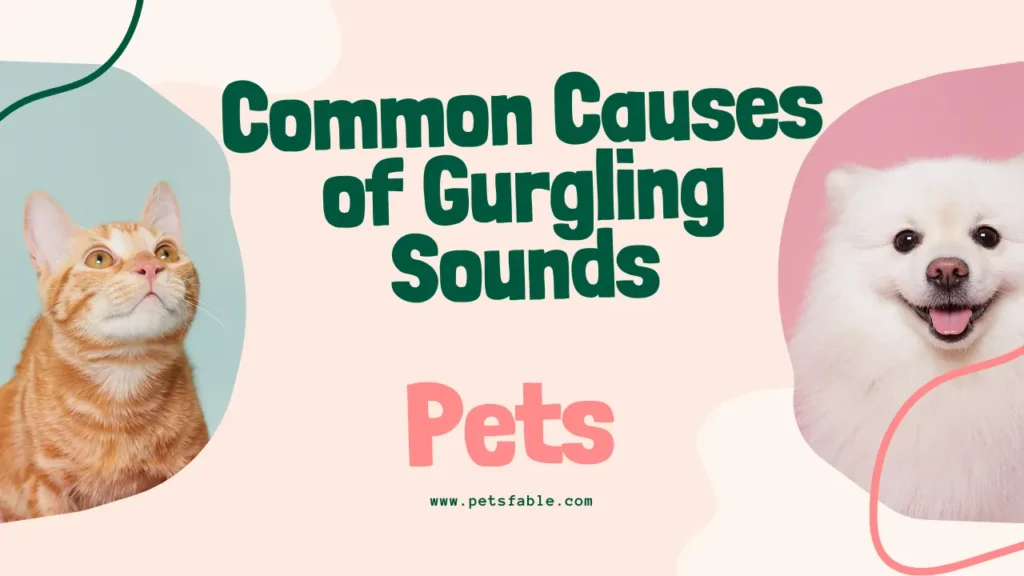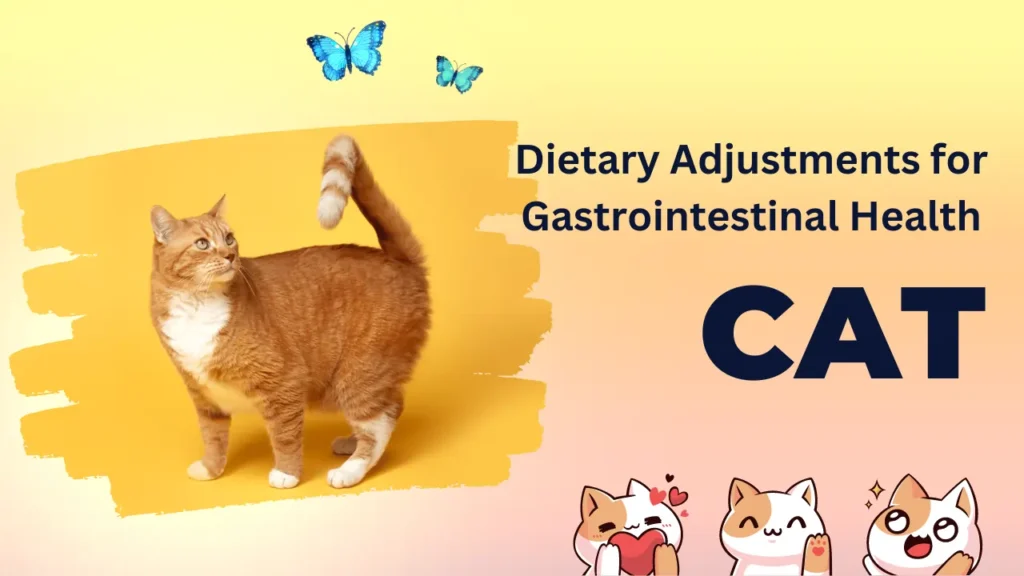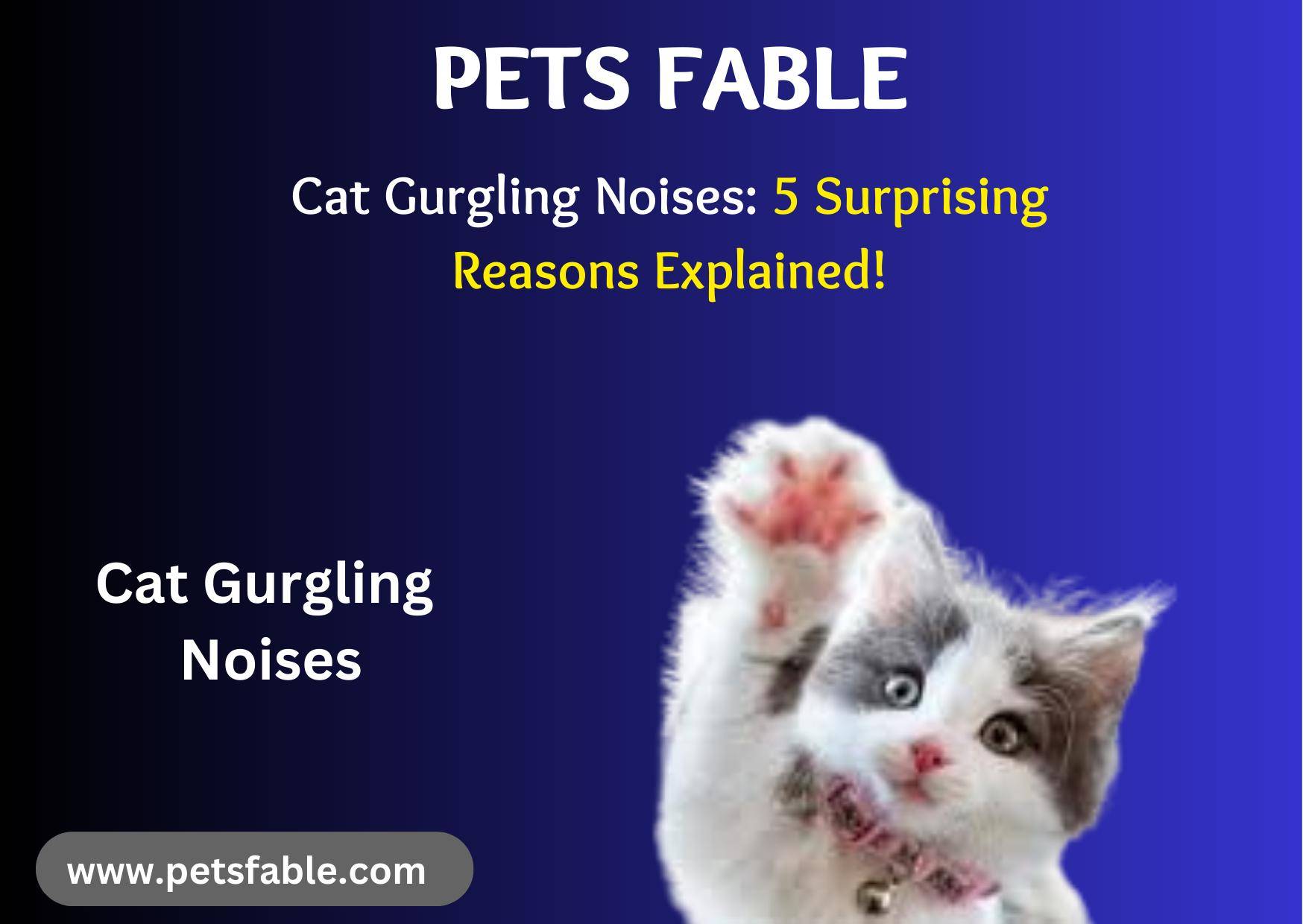Understanding the Causes of Cat Gurgling Noises
When your Cat Gurgling Noises in its throat, it could be signaling underlying health issues. Here are some potential reasons:| Cause | Description |
|---|---|
| Respiratory Infections | A common cause of throat gurgling in cats, indicating they may be struggling with a respiratory issue. |
| Allergies | Allergic reactions can cause inflammation in the airways, leading to gurgling sounds. |
| Digestive Troubles | Gastrointestinal issues can also manifest as Cat Gurgling Noises if your cat is experiencing discomfort in its stomach or throat. |
| Throat Obstruction | The noise might suggest something is obstructing your cat’s throat, which can be serious if not addressed. |
| General Discomfort | Sometimes, gurgling could simply be a sign of general discomfort or distress in your cat. |
What to Do If Your Cat Is Gurgling
Monitor your cat for other symptoms such as coughing, sneezing, or changes in eating habits. Persistent gurgling, especially if accompanied by other signs of illness, requires immediate veterinary attention.
A timely consultation with your veterinarian is crucial to diagnose the cause properly and start appropriate treatment, ensuring your cat’s health and comfort.
Introduction to Cat Gurgling Sounds
Cats often communicate through various vocalizations, from purrs to growls, each with its own context and significance. Among these, the gurgling sound in a cat’s throat can be particularly concerning, as it may indicate health issues.
Understanding Feline Vocalizations
Cat Gurgling Noises, including meows, chirps, and gurgles. Each vocalization serves as a clue to their emotions, desires, or health status. Being attuned to these sounds can greatly enhance how cat owners respond to their pets’ needs.
Read more: is-your-dog-lethargic-5-signs-you-shouldnt-ignoreThe Significance of Gurgling Noises
Gurgling is less common than other feline noises and is often not associated with contentment. This sound may suggest potential health problems that need attention.
Common Causes of Gurgling Sounds

Respiratory Issues:
Conditions like bronchitis or asthma can cause gurgling, especially if accompanied by coughing or wheezing.
Gastrointestinal Problems:
Issues such as acid reflux or indigestion may manifest as gurgling. Observing changes in eating habits or bathroom behavior can help identify these problems.
Obstructions:
A foreign object lodged in the throat can also cause gurgling noises.
Differentiating Between Normal and Concerning Sounds
While some gurgles may occur during relaxed breathing or after drinking water, persistent gurgling, especially if accompanied by other symptoms, warrants further investigation.Health Implications of Throat Gurgles in Cats
Respiratory Conditions and Symptoms
If gurgling is paired with symptoms like labored breathing or wheezing, it’s critical to seek veterinary care promptly, as these could indicate serious respiratory issues.
Read more: Health Implications of Throat Gurgles in CatsGastrointestinal Issues Leading to Gurgles
Besides respiratory causes, gurgling may signal gastrointestinal disturbances. Signs to watch for include vomiting, changes in appetite, or unusual bowel movements.
When Gurgling Indicates an Emergency
Urgent veterinary care is needed if gurgling comes with severe symptoms such as blue-tinted gums, extreme lethargy, or breathing difficulties. These could be signs of life-threatening conditions.
Conclusion
Recognizing and understanding the context and implications of your cat’s gurgling sounds can be vital for their health. Regular monitoring and prompt response to unusual vocalizations like gurgling can help ensure your cat’s well-being and potentially prevent more serious health issues.
Diagnostic Approaches for Gurgling Sounds in Cats
Veterinary Examination Techniques
A comprehensive veterinary check-up is crucial for diagnosing the cause of a cat’s throat gurgling. This examination typically involves listening to the cat’s lungs, checking the throat, and evaluating overall physical health to spot potential problems.
Advanced Diagnostic Tools
In certain cases, more advanced tools such as X-rays, ultrasounds, or endoscopies may be required to thoroughly assess the cat’s internal health and determine the specific reason for the gurgling sounds.
Treatment Options for Cats with Gurgling Sounds
Medical Interventions for Respiratory Issues
If the gurgling is due to respiratory issues, the treatment may include administering antibiotics, steroids, or inhalers to alleviate inflammation and resolve any infections. It is crucial to adhere strictly to the veterinarian’s instructions to achieve the best results.
Dietary Adjustments for Gastrointestinal Health

Should gastrointestinal problems be causing the gurgling, dietary modifications might be advised. Recommendations could include switching to easily digestible foods, increasing dietary fiber, or adding probiotics to enhance gut health.
Home Care and Remedies Cat Gurgling Noises
Supporting your cat’s recovery at home is also important. This includes ensuring they have a tranquil space to rest, maintaining hydration, and following any specific dietary recommendations from the vet.
Preventative Measures and Overall Well-being
Regular Health Check-ups and Vaccinations
Engaging in preventative care, such as consistent health check-ups and keeping vaccinations up-to-date, is essential for sustaining your cat’s health and avoiding conditions that might lead to gurgling.
Read more: Preventative Measures and Overall Well-beingNutritional Management and Hydration
Providing a balanced diet and continuous access to fresh water plays a significant role in preventing both gastrointestinal and respiratory issues that can cause gurgling.
Stress Reduction and Environmental Enrichment
Since cats are particularly prone to stress, which can aggravate health issues, fostering a supportive environment with ample stimulation is beneficial for their physical and mental well-being.
Conclusion: Cat Gurgling Noises
Monitoring and understanding the various sounds your cat makes, including gurgling, is key to ensuring their health. Prompt attention to changes in their vocalizations can prevent minor issues from escalating into serious problems. By taking a proactive approach to veterinary care, nutrition, and environmental enrichment, you can help your cat enjoy a long, healthy, and contented life.FAQs: Cat Gurgling Noises
Why does my cat make a weird sound in his throat?
This sound, often a result of “reverse sneezing,” is caused by a spasm in the throat that constricts the glottis, disrupting airflow and producing a noticeable snorting noise.
Why is my cat making weird gurgling noises?
Commonly known as borborygmic, these gastric sounds are a normal part of digestion. Changes in gut flora can affect their frequency and intensity, which, although usually harmless, can sometimes indicate digestive issues.
What does it mean when a cat makes a guttural sound?
Guttural meows, typically low-pitched and intense, often occur when a cat is distressed—like during an unfamiliar grooming session or a vet visit. This indicates your cat’s discomfort.
Why does my cat make a weird noise?
Sounds like growling, hissing, or spitting can indicate that your cat is irritated, scared, or upset. Conversely, a yowl or howl might signal distress due to discomfort or disorientation. If such noises persist, it’s crucial to check on your cat’s well-being.
What does respiratory distress sound like in cats?
Symptoms of respiratory distress in cats include a respiratory rate over 40 breaths per minute, seeking isolation, coughing similar to hacking up a hairball, and breathing with an open mouth, which is unusual outside of stressful situations.
Cat Gurgling Noises in throat when purring
If your cat’s purring is accompanied by gurgling sounds, this could be a sign of a respiratory issue or an obstruction. Monitoring for any additional signs of distress and consulting a veterinarian is recommended.
Cat Gurgling Noises breathing
Gurgling sounds during breathing may indicate serious health issues such as respiratory infections or fluid accumulation. It’s important to observe any other symptoms and seek veterinary care promptly.
Cat making weird noise like something stuck in throat
If your cat is making noises that suggest something is stuck in its throat, seek veterinary attention immediately to address any potential obstructions.
Cat Gurgling Noises in throat after surgery
Post-surgery gurgling sounds in your cat’s throat should be closely monitored. Consulting with a veterinarian is essential to rule out any complications or infections following the procedure.

nice article